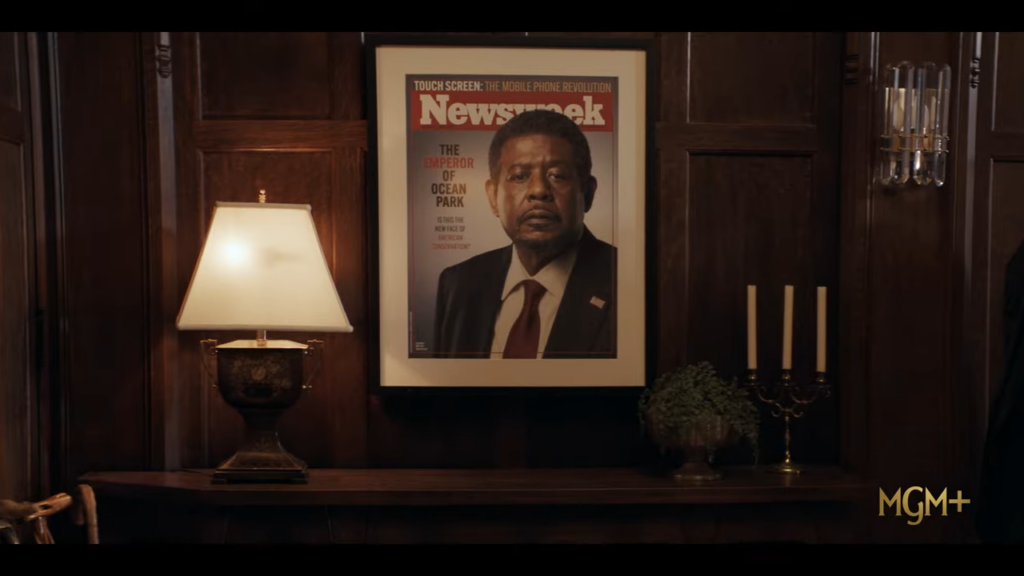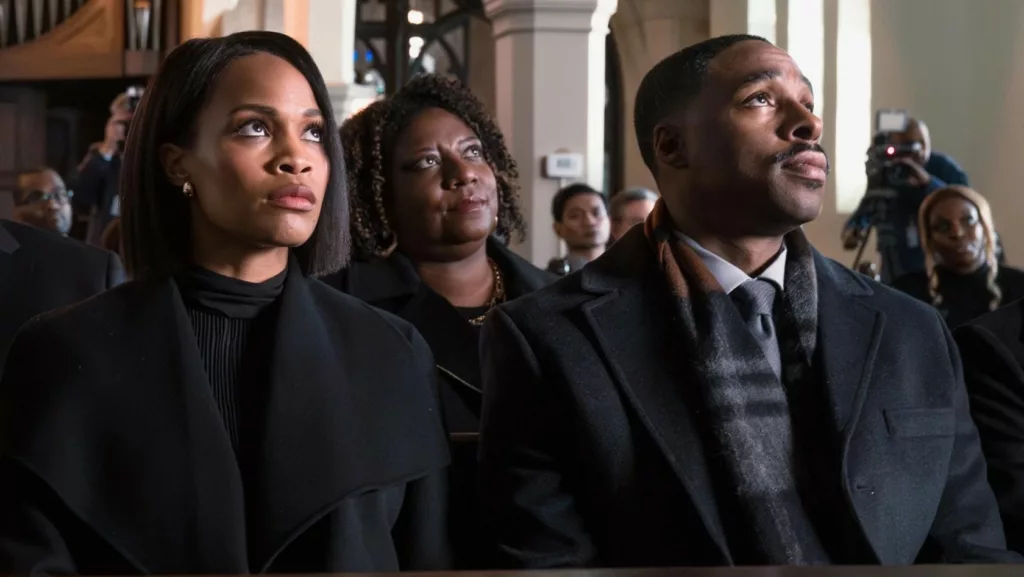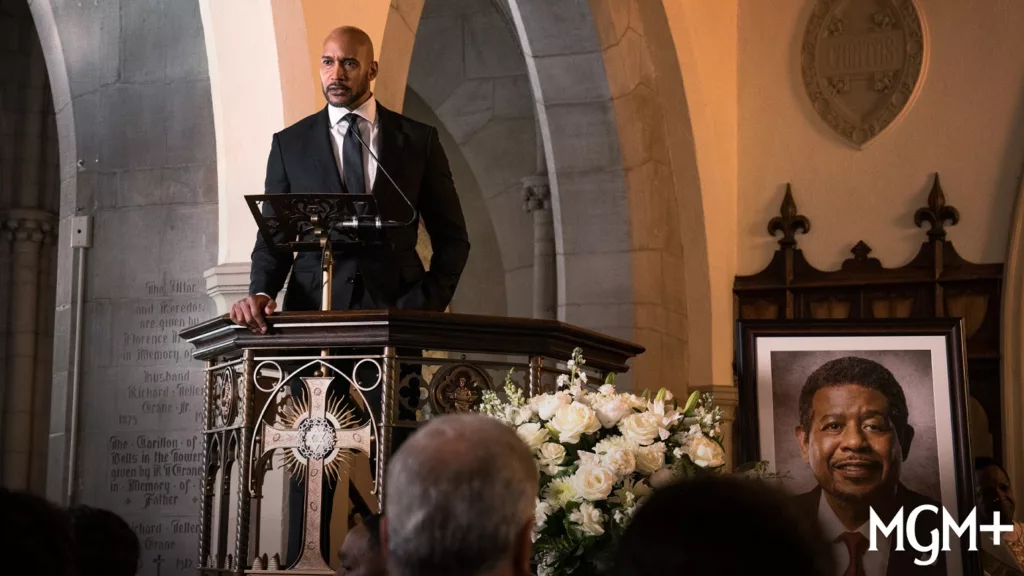Adapted from Stephen L. Carter’s acclaimed novel, The Emperor of Ocean Park looks at the lingering impact of one man on his family. Renowned federal judge Oliver Garland, portrayed powerfully by Forest Whitaker, was a figure who commanded respect far beyond the courtroom. His unexpected death leaves behind many unanswered questions for his three adult children.
Tal, played by Grantham Coleman, is a law professor at the University of Chicago trying to unravel the mystery surrounding their father’s final wishes. Joining the search is his sister Mariah, brought to life by Tiffany Mack. She never lost her curiosity from her days as an investigative journalist. And rounding out the siblings is Addison, portrayed with depth by Henry Simmons.
Together, the three embark on a journey of discovery in their hometown of Chicago. Piecing together memories of their father, they aim to solve the riddle around these “arrangements.” But as secrets come to light, their vision of the man they knew is challenged. Whitaker illuminates both the admiral judge and the complex person underneath.
Woven throughout are themes of family, identity, and legacy. The show explores what it means to carry a famous name and live in another’s shadow. Over ten absorbing episodes, the truth emerges bit by bit. This review will take a look at the characters, adaptation challenges, and what this series has to say about fathers and their influence, even after they are long gone.
Following the Father
The sudden death of Judge Oliver Garland sets off a mystery his three children must solve. Patriarch of a powerful family, Oliver left behind only cryptic clues about “the arrangements.” This sends Tal, Mariah, and Addison on an engrossing journey to uncover their father’s secrets.
As a law professor, Tal seems level-headed—until he learns the arrangements are being hunted by dangerous people. His quest awakens dormant wounds from his past. Mariah lends her journalistic skills; certain foul play is involved. Yet for all her drive, Mariah’s motivations feel clouded by resentments towards her father.
Addison, the eldest, strives to avoid the fray. But his slick TV persona cannot hide his own unresolved issues with Oliver. These siblings struggle under the weight of expectations from the formidable judge. But finding the truth threatens to upend all they thought they knew.
Anchoring this tale is Forest Whitaker’s tour-de-force as Oliver Garland. His flashes of compassion are few; he is overwhelmed by arrogance and control. Whitaker breathes life into both the public and private faces of this enigmatic man. We see a father who pushed his children to excel yet kept them at an icy distance.
Beyond Whitaker, character development proves more shallow. Tal, Mariah, and Addison emerge as types fulfilling roles in the mystery, not fully realized people. Their arcs remain static as the story unravels. Subplots, like those involving Tal’s marriage, prove distracting rather than illuminating.
Ultimately, this becomes Whitaker’s show, and rightfully so. He elevates a story that otherwise risks losing itself among soapier distractions. In following their father’s trail, these children begin to understand the man behind the myth. For that insight alone, the journey is worth taking.
Transitioning from Page to Screen
Adapting Stephen L. Carter’s acclaimed novel for television came with challenges. The book does many things well, from legal drama to conspiracy thriller. But its winding plot and static hero prove less engaging for a screen adaptation. Some changes were needed to make Emperor of Ocean Park work as a series.
In the novel, Talcott Garland narrates from a distance, recalling events with wry detachment. On screen, the character required more emotive gravitas to anchor the mystery. The show also shifts focus outward, exploring Judge Oliver Garland’s life in greater detail through flashbacks. This brings the enigmatic figure to life, allowing viewers to better understand his impact on family.
The source material’s tangents posed difficulties for episodic storytelling. Its pace indulges philosophical musings that stilted action on television. In trimmed form, the thriller elements took precedence. Subplots were streamlined to serve mystery over character studies. This sacrificed nuance but ensured a propulsive revelation of secrets.
Mariah played a breakout role, reflecting the show’s outward perspective. The book keeps her at arm’s length. But in Tiffany Mack’s portrayal, Mariah’s suspicions and blunt nature drive the plot forward from episode to episode. Her journalistic skills shed light in dark places. The character adds pep where Tal can drone.
Of course, some get lost between page and screen. The academic rumblings fade. Subtle cynicism loses impact. Yet overall, the adapted script surmounts structural hurdles to craft mystery and family drama in balance. The question remains: can a time-hopping style satisfy viewers used to information delivered weekly?
Ultimately, Emperor of Ocean Park as a series takes valid strides to realize its rich source material on screen. The challenge now lies in maintaining momentum to its satisfying conclusion.
Sherman Payne’s Vision Comes to Life
Showrunner Sherman Payne had no small task in bringing Stephen L. Carter’s dense, twisting novel to the screen. Across ten episodes, he seamlessly blends past and present to reveal Oliver Garland’s true legacy.
Directing duties vary, but all elevate the material with calm, steady hands. Flashbacks flow naturally, thanks to careful scene transitions. Subtle pushes us to focus our attention where needed. Though plotlines proliferate, the viewer never feels lost.
Cinematography embraces both intimacy and scale. Tight shots emphasize emotional beats, from grief-stricken faces to heated arguments. Sweeping establishing shots place us in locales like Martha’s Vineyard and the University of Chicago. These iconic settings become characters in their own right.
Beyond New England, as featured in the book, production carried the story elsewhere. Scenes filmed in Alabama portray Oliver’s roots and painful past. Chicago brings Tal’s academic world to life, with real campus spots adding verisimilitude. Authentic local areas substitute seamlessly for fictional locations.
The technical elements shine too. Gorgeous lighting bathes flashbacks in nostalgia’s warm glow. Shadowy scenes ramp up suspense. Effects showcase pivotal moments yet avoid melodrama. Subtle Foley work immerses us in the world. Edgy vibes from Mark Isham’s score lend drama an edge.
With a deft directorial touch and vibrant production values, Payne honors Carter’s intricate source while crafting true visual storytelling. His artistic vision transforms complex characters and their mysteries into a gripping on-screen saga. Fans will find much to appreciate in how the novel springs vividly to life.
Redefining Legacy
Under the intrigue of conspiracy and mystery, Emperor centers on a deeper theme: how children reconcile the idealized vision of a parent with the flawed human beneath. Judge Garland clearly shaped his kids, but each now views him differently after his death lifts the veil.
As a black conservative, Oliver navigated complex racial politics. He pushed his family to succeed despite obstacles, though stern lectures came from a place of caring or control, depending on perspective. His legacy grows complex as secrets emerge, forcing Tal, Mariah, and Addison to reevaluate the father they thought they knew.
Questions of identity also feature prominently. All three siblings carved their own paths, yet they never escaped their father’s lengthening shadow. Each must forge a new understanding of themselves apart from Oliver’s ideals. For Black Americans especially, defining one’s own identity outside of expectations carries weighty significance.
The family explores these deeper issues amid the thrill of mystery. Tense scenes see emotions boil over as the past collides with present realities. Subtle acting captures the difficulty of loosening a parent’s grip on one’s story while honoring the role they played.
Perhaps most insightfully, Emperor portrays the messiness of legacy. No figure leaves a simple stamped impression. Those who strived to shape the world in life still leave ripples, for good or ill, that outlast them. The question becomes whether we’ll remember only headlines or seek the whole truth, however unflattering, and use it to keep growing.
By depicting a family’s profound journey towards accepting each other fully, warts and all, the series sends a message as timeless as the parent-child bond: that the most noble tributes honor multi-faceted humans, not cardboard saints. And that redefining what we inherited doesn’t mean rejecting the past, but building upon it.
Representing a complex legacy
Forest Whitaker is a real standout in Emperor of Ocean Park. His judge, Oliver Garland, is stormy yet intelligent, with layers you continuously uncover. Scenes featuring Oliver shine brightest, with Whitaker lending the character real nuance. You believe this man shaped his family in profound ways, for better or worse. It’s impressive to depict someone so pivotal after their death.
Yet where Whitaker excels, other characters feel thin. The three siblings searching for answers—Tal, Mariah, and Addison—never achieve that fullness. You understand their connection to Oliver and little else. Their personal plots wander aimlessly. Mariah, in particular, appears defined by shallow traits, stunting your investment in her storyline.
The family dynamics could have felt so rich. But without multi-faceted main players, interactions between siblings ring hollow. Flashbacks shed light on their father, not themselves. It’s a missed opportunity for real insight.
Consistency also proves a struggle. Thrilling mysteries tease throughout, yet payoffs often disappoint. Predictable reveals and slow pacing take the edge off. Red herrings lead in exhaustive circles instead of advancing character work or theme.
Subtle social commentary does emerge in many poignant discussions of race and legacy. But these profound notes get buried beneath a jumble of loose threads. The larger commentary and Oliver’s full significance become muddled instead of clear.
At its best, Emperor of Ocean Park illuminates how experience and identity inform how we see our parents. But an inability to strike balance makes for an uneven experience overall. With refinement, this complex family saga could have resonated much more powerfully. As is, Whitaker’s tour de force performance remains the most indelible memory.
The Emperor’s Legacy
So in the end, what to make of Emperor of Ocean Park? The series tackles ambitious source material, aiming to adapt Stephen Carter’s layered novel rich with character studies, social commentary, and genre thrills. Yet spreading all this across ten episodes proves challenging.
While faithful to the book’s core mystery, the show struggles to balance intrigue with family drama. Character depth suffers as subplots multiply, and the non-linear timeline muddles more than it illuminates. Still, Forest Whitaker shines as Judge Garland, bringing nuance to a pivotal figure haunting both pages and screen.
As a standalone work, Emperor arrives at its conclusion but leaves questions. Predictable reveals weaker thrill moments. And characters beyond Whitaker lack the dimensionality to fully engage.
Yet glimpses of profundity emerge too. Thought-provoking debates around race, identity, and legacy especially resonate. Had these themes been tighter integrated into character arcs, the result might have resonated more powerfully.
Ultimately, Emperor of Ocean Park aims high but falls short of greatness. While its ambitious source proves nearly impossible to perfectly adapt, trimming certain distractions may have streamlined the narrative and spotlighted its most fascinating aspects. As is, Whitaker’s presence remains the most indelible, proving some adaptations thrive more freely spinning off established works than faithfully continuing them.
So in the end, Emperor remains an uneven yet not unsatisfying viewing experience for those curious about its creative team’s vision. But for the most nuanced character exploration and intrigue, readers may find solace in returning to Carter’s original novel instead.
The Review
Emperor of Ocean Park
Emperor of Ocean Park attempted lofty goals in adapting Stephen L. Carter's complex novel but got lost in frequently redundant subplots and narrative non-linearity that muddled more than enriched. Forest Whitaker alone makes an otherwise uneven watch worthwhile as an unforgettable leading character.
PROS
- Forest Whitaker gives a nuanced, compelling performance as Judge Garland
- Thought-provoking themes of race, identity, and family dynamics
- Glimpses of intrigue in a mystery plot
CONS
- Overly soapy, redundant subplots clutter the focus on the central mystery
- A non-linear timeline damages narrative clarity and pacing
- Supporting characters lack depth and dimensionality
- Predictable reveals undermine thriller moments





















































